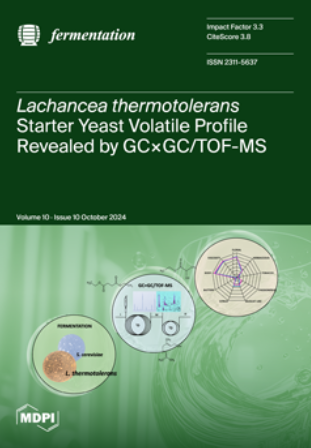Alcohol-Free Beer Produced Using Maltose-Negative Wine Yeast Saccharomyces cerevisiae with Probiotic Potential
IF 3.3
3区 农林科学
Q2 BIOTECHNOLOGY & APPLIED MICROBIOLOGY
引用次数: 0
Abstract
The ideal yeast for the production of alcohol-free beer does not form ethanol, produces a distinct and pleasant taste and has probiotic properties. This study characterized the potential of a wine yeast, Saccharomyces cerevisiae CCM 9181, to be an ideal alcohol free beer strain. It was found to be maltose-negative, and the ethanol content in fermented all-malt wort has never exceeded the legal limit of 0.5% v/v. Its specific growth rate (µ) was the highest at 25 °C (μ = 0.41 ± 0.01 h−1) and it was not affected by iso-α-bitter acids (15–50 IBU, international bitterness units). A response surface methodology was used to optimize the temperature and pitching rate affecting the formation of total higher alcohols and esters. A statistical analysis of the experimental data revealed that temperature affected esters most significantly, while both temperature and pitching rate had the most significant effects on higher alcohols. The sensory properties of beers were evaluated by trained panelists and they were described as malty, clove-like, having a very mild bitterness and a bouquet of white wine. The survival rate of S. cerevisiae CCM 9181 after simulated passage through the gastrointestinal tract was investigated as a first step to evaluate its probiotic properties. Our analyses show that Saccharomyces cerevisiae CCM9181 is a suitable candidate for the large-scale commercial production of alcohol-free beer and has probiotic potential that needs to be studied further.利用具有益生菌潜力的麦芽糖阴性葡萄酒酵母生产无酒精啤酒
生产无酒精啤酒的理想酵母不形成乙醇,产生独特宜人的味道,并具有益生菌特性。本研究表征了酿酒酵母CCM 9181作为一种理想的无酒精啤酒菌株的潜力。检测结果为麦芽糖阴性,全麦芽麦芽汁的乙醇含量从未超过0.5% v/v的法定限量。其比生长率(µ)在25°C时最高(μ = 0.41±0.01 h−1),不受iso-α-苦味酸(15-50 IBU,国际苦味单位)的影响。采用响应面法优化了温度和俯仰速率对总高级醇酯生成的影响。对实验数据的统计分析表明,温度对酯类的影响最为显著,而温度和俯仰速率对高级醇的影响最为显著。啤酒的感官特性是由训练有素的小组成员评估的,他们被描述为麦芽,丁香状,有非常轻微的苦味和白葡萄酒的气味。研究了酿酒酵母CCM 9181在模拟通过胃肠道后的存活率,作为评价其益生菌特性的第一步。我们的分析表明,酿酒酵母CCM9181是大规模商业生产无酒精啤酒的合适候选者,具有益生菌潜力,需要进一步研究。
本文章由计算机程序翻译,如有差异,请以英文原文为准。
求助全文
约1分钟内获得全文
求助全文
来源期刊

Fermentation-Basel
BIOTECHNOLOGY & APPLIED MICROBIOLOGY-
CiteScore
3.80
自引率
18.90%
发文量
594
审稿时长
7 weeks
期刊介绍:
Fermentation-Basel is an international open access journal published by MDPI, focusing on fermentation-related research, including new and emerging products, processes and technologies, such as biopharmaceuticals and biotech drugs. The journal enjoys a good reputation in the academic community and provides a high-impact forum for researchers in the field of bioengineering and applied microbiology.
 求助内容:
求助内容: 应助结果提醒方式:
应助结果提醒方式:


